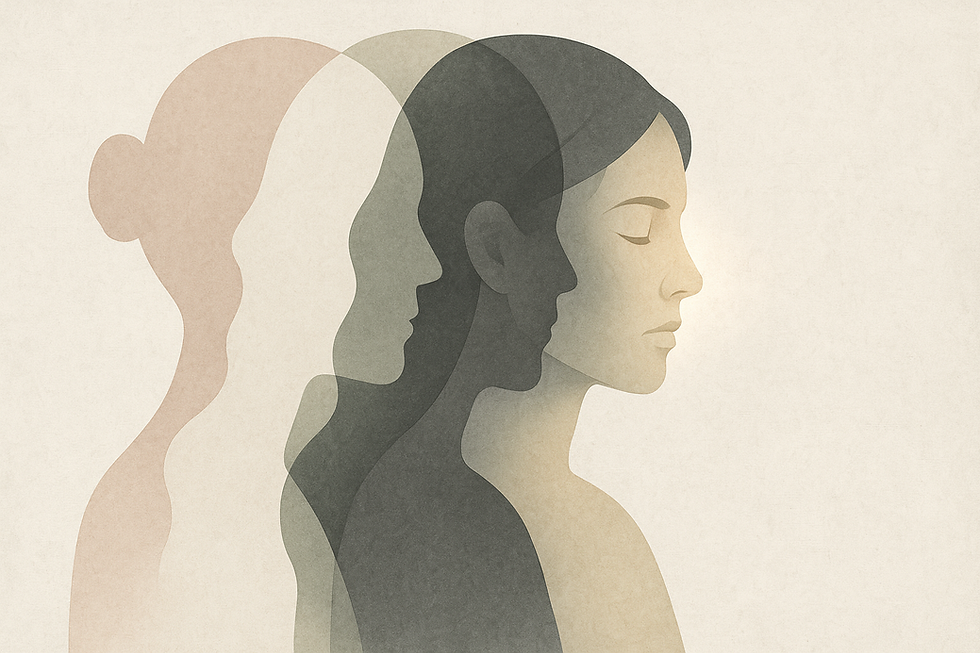Survivor Voices: Katie's Story
- Trina Kay

- Sep 28, 2025
- 5 min read
Katie is a 30-year-old single mom who made the brave decision to leave her abuser one year ago. When we connected on Zoom, she bounced her baby gently against her chest as we spoke. Her daughter is both a reminder of what was once good, and a symbol that something beautiful can emerge even from the most difficult circumstances.
Katie’s story showcases the highs and lows of abusive relationships. As she shared, “It’s not all bad or you wouldn’t stay.” The gestures of affection—the flowers, the freshly painted house, the gifted desk and new computer—become confusing. The good moments make you question if maybe you are exaggerating the bad ones. That is how the cycle continues.
Her first interaction with him was through Instagram. “I think I’m in love,” read the first message from a man she didn’t know. At the time, Katie was newly single and open to the attention. “Looking back I now see that as a red flag. Why would a stranger say that to me?”
Since leaving, she has heard from other women who experienced the same treatment. Katie raises the painful truth that silence enables the cycle: when survivors don’t or can’t speak up, abusers often move on without accountability, leaving the next victim unprepared.
Recognizing Patterns
When asked if she noticed behaviors in hindsight, Katie was candid:
“Until you’re out of it you don’t really realize those patterns or behaviors while you’re in it. You just think it’s normal and you’re just gaslit and manipulated to believe that what you’re living is normal.”
For her, the biggest pattern was what’s known as love bombing—the overwhelming flood of affection, gestures, and attention designed to make someone feel cherished and dependent.
“He would make me feel like I was the most important person and a princess. He would open the door for me, caress my shoulder in the car and all the words of affirmation that a girl could ever want.”
But alongside the affection came suspicion and control. “And it kept happening where he would accuse me of fooling around with x amount of people.”
One moment in particular stays with her:
“I’m the type of person where if we’ve just had a fight I want to be left alone—don’t touch me. So, he wanted to touch my shoulder or hold his hand, and I shooed him off and he got really angry. ‘You never shoo off my hand! Ever! If I want to touch you, I’m going to touch you. Don’t ever do that!’”
From there, the control escalated. He would spend hours combing through her Instagram history, interrogating her about posts and people from a decade earlier. Katie remembers sleeping in her car for relief from the constant verbal attacks.
“I would be in my car reading articles on narcissists because he kept telling me that I was a narcissist. But while reading I’m like I don’t do these things—but he does…”
Breaking Free
Katie described the impossible balance of good days and terrible ones:
“Here’s the thing with these relationships: There are good days. And there are days of love. And you try and convince yourself that the good outweighs the bad.”
But the bad was relentless. “I was constantly berated and shamed for anything from my past. He said I was disgusting, and he couldn’t stand to even be near me.”
In trying to regain his trust, Katie erased parts of herself. She deleted Instagram posts, unfollowed male colleagues, quit working out, and shared her location whenever she left the house.
Her abuser insisted she seek therapy for narcissism. Instead, her psychologist gave her the clarity and warning she needed: she was not the problem—and she was not safe. “Because 95% of the time if they are physical with their environment, they will escalate to being physical with you as well.”
Isolation and Impact
The abuse seeped into every corner of her life.
“The only people I spoke to (and it was only when he wasn’t home) were my best friend and my mentor. I rarely called my parents. I didn’t talk to my brother. My relationships suffered. I lost a lot of people. And my work suffered. I lost clients. I was barely bringing in any income. I stopped posting on social media which is what I relied on for my income. I was very isolated. I didn’t even feel comfortable going to a grocery store. In case a man said hello to me. I was scared. I didn’t go anywhere. I would use Instacart and DoorDash. If I didn’t have to go anywhere it was a better day. I stayed home and locked myself in my office. It was rough.”
Lessons and Warnings
When asked what she’d want others to know, Katie didn’t hesitate:
“Trust your gut. Your gut usually is able to tell the truth. And how your body responds. I think your body keeps a lot of information and your gut absorbs a lot of information. For me I ignored the anxiety. I ignored the uneasiness. I ignored the pain in my body when it came to intimacy. Which I had never experienced before. Looking back on those things it was my body’s way of saying, 'this is not safe. High alert! Red flags!' And I ignored it.”
“If you suspect anything or if you start making excuses for their behavior that’s not okay. You should never make excuses for someone’s ill behavior. And if you start isolating yourself. You should never do that. You need your people.”
To those on the outside looking in, she adds:
“For people who haven’t experienced it my thing would be—do your research and educate yourself on who these people actually are and what actually happens. My favorite that I see and hear all the time is ‘Why didn’t you just leave? Why would you have a kid with them?’ It’s not that simple to answer and you truly don’t understand it unless you’ve lived it. It’s really hard to explain to someone who hasn’t lived it that Stockholm syndrome that keeps you stuck. The cycle of love bombing and abuse and you just can’t break free.”
What She Would Tell Herself
Looking back, Katie knows exactly what she would want to say to the version of herself trapped in that cycle:
“It’s not your fault. You are loved and you don’t deserve this. You are forgiven for what you’ve done in the past. It shouldn’t be used against you. It’s not your fault. I know I said that twice. But it’s not your fault.”
And she closes with this reminder for anyone reading:
“Mental, emotional and verbal abuse is still abuse. Just because you don’t get hit in the face doesn’t mean that you’re not being abused. I think that’s what a lot of women justify, ‘Well he hasn’t hit me so I’m okay.’ I’ve told women that I would take a thousand hits to the face than the verbal abuse because bruises I can hide with some concealer and foundation. The verbal abuse takes longer to heal from.”
Katie’s bravery is in her honesty. She shows us not just the wounds of what she endured, but the strength it takes to speak them aloud. Her story is a reminder: the shame was never hers to carry.
This story is part of the Survivor Voices series, where we share one story each week to shed light on the many forms abuse can take. These stories remind us that anyone—any age, any background—can wake up one day and find themselves in an abusive relationship. Our goal is to break the silence, remove the shame, and make sure no one feels alone in their experience. Read the full series at Trina-Kay.com.
📌 If you or someone you know is in an unsafe relationship and needs help
Call the National Domestic Violence Hotline: 1-800-799-7233
or text “START” to 88788
💌 Are you a survivor ready to share your story?
Email: TrinaKayLLC@gmail.com
🌻 Support families navigating life after disclosure Visit the Blue Sunflower Foundation





Comments